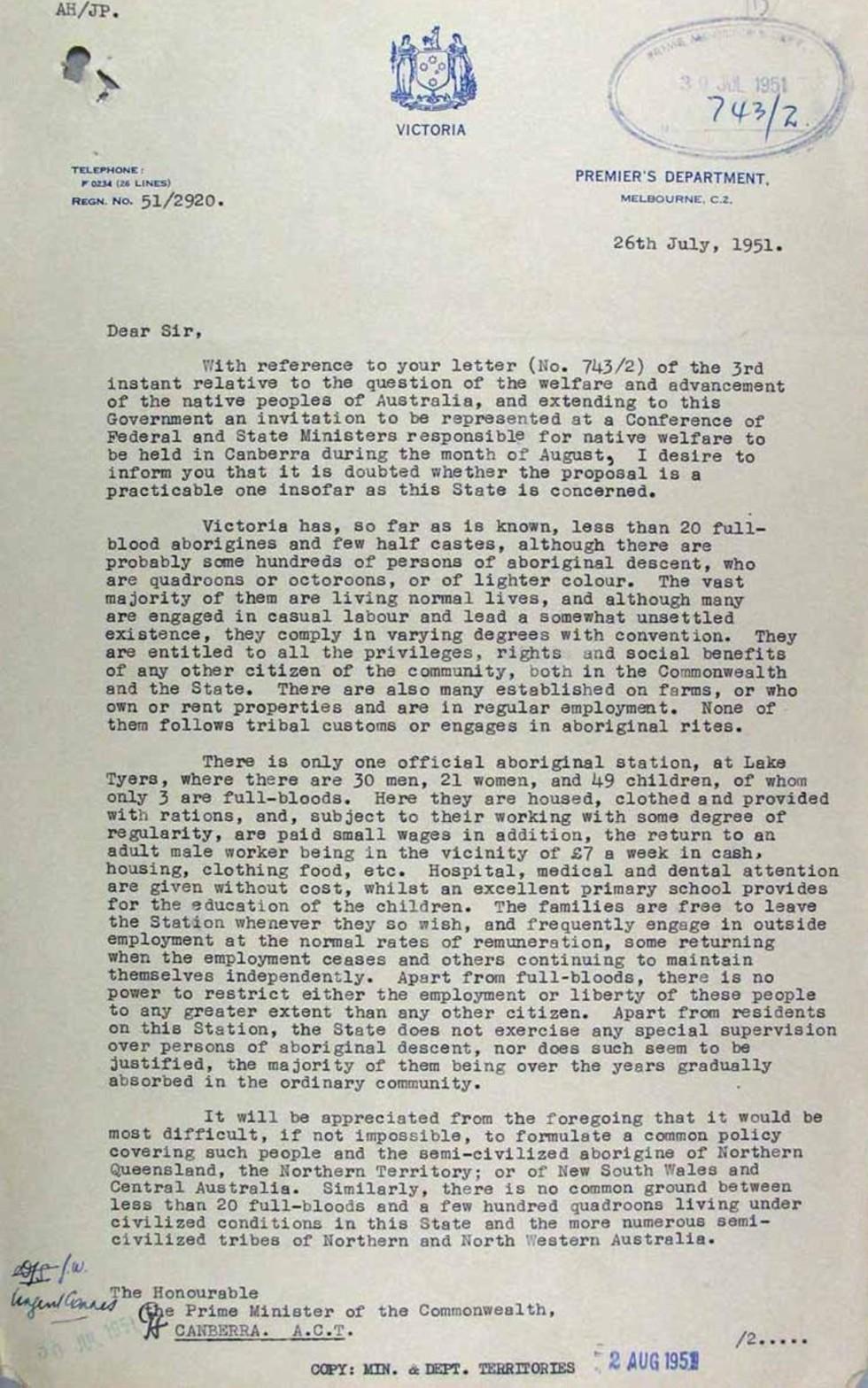
Reply to Prime Minister Robert Menzies' invitation to a conference on 'native welfare'.

Reply to Prime Minister Robert Menzies' invitation to a conference on 'native welfare'.
Aboriginal and Torres Strait Islander people should be aware that the National Archives' website and collection contain the names, images and voices of people who have died.
Some records include terms and views that are not appropriate today. They reflect the period in which they were created and are not the views of the National Archives.


Reply to Prime Minister Robert Menzies' invitation to a conference on 'native welfare'.

Reply to Prime Minister Robert Menzies' invitation to a conference on 'native welfare'.
[Typed in black ink in top left corner:] AH / JP.
[Letterhead in blue ink displays Victorian coat of arms, with the words 'VICTORIA', 'PREMIER'S DEPARTMENT.' 'MELBOURNE, C.Z.', and 'REGN. NO.' [registration number], which is followed by '51/2920' typed in black ink.]
[Stamped in blue ink:] PRIME MINISTER’S DEPT. 30 JUL 1951
[Inside the stamp, handwritten in blue ink, '743/2'.]
26th July, 1951.
Dear Sir,
With reference to your letter (No. 743/2) of the 3rd instant relative to the question of the welfare and advancement of the native peoples of Australia, and extending to this Government an invitation to be represented at a Conference of Federal and State Ministers responsible for native welfare to be held in Canberra during the month of August, I desire to inform you that it is doubted whether the proposal is a practicable one insofar as this State is concerned.
Victoria has, so far as is known, less than 20 full-blood aborigines and few half castes, although there are probably some hundreds of persons of aboriginal descent, who are quadroons or octoroons, or of lighter colour. The vast majority of them are living normal lives, and although many are engaged in casual labour and lead a somewhat unsettled existence, they comply in varying degrees with convention. They are entitled to all the privileges, rights and social benefits of any other citizen of the community, both in the Commonwealth and the State. There are also many established on farms, or who own or rent properties and are in regular employment. None of them follows tribal customs or engages in aboriginal rites.
There is only one official aboriginal station, at Lake Tyers, where there are 30 men, 21 women, and 49 children, of whom only 3 are full-bloods. Here they are housed, clothed and provided with rations, and, subject to their working with some degree of regularity, are paid small wages in addition, the return to an adult male worker being in the vicinity of £7 a week in cash, housing, clothing food, etc. Hospital, medical and dental attention are given without cost, whilst an excellent primary school provides for the education of the children. The families are free to leave the Station whenever they so wish, and frequently engage in outside employment at the normal rates of remuneration, some returning when the employment ceases and others continuing to maintain themselves independently. Apart from full-bloods, there is no power to restrict either the employment or liberty of these people to any greater extent than any other citizen. Apart from residents on this Station, the State does not exercise any special supervision over persons of aboriginal descent, nor does such seem to be justified, the majority of them being over the years gradually absorbed in the ordinary community.
It will be appreciated from the foregoing that it would be most difficult, if not impossible, to formulate a common policy covering such people and the semi-civilized aborigine of Northern Queensland, the Northern Territory; or of New South Wales and Central Australia. Similarly, there is no common ground between less than 20 full-bloods and a few hundred quadroons living under civilized conditions in this State and the more numerous semi-civilized tribes of Northern and North Western Australia.
[Addressed to] The Honourable
the Prime Minister of the Commonwealth,
CANBERRA. A.C.T. [underlined]
/2....
[Stamped in black ink:] COPY: MIN. & DEPT. [Minister & Department] TERRITORIES
[Stamped in blue ink:] 2 AUG 1951
[Handwritten annotation in bottom left corner:] DJS/.W [two illegible words.]
[Stamped in faded ink:] 30 JUL 1951
[Page] -2-
Generally speaking, it could be said that, although isolated incidents occur necessitating individual treatment, the problem of the aborigine has disappeared from this State. The assimilation of persons of aboriginal descent of course still continues as a steady process, but it is considered that this problem will have largely disappeared within the next generation.
So far as Victoria is concerned, its essential expenditure upon the aborigine is so little that Commonwealth intervention or assistance is hardly warranted, nor are they required.
In all the circumstances, therefore, my Government feels that little purpose could be served by this State being represented at the proposed Conference.
Yours faithfully,
John G B McDonald [Handwritten signature.]
J.G.B. McDonald,
Premier.
Learn how to interpret primary sources, use our collection and more.
